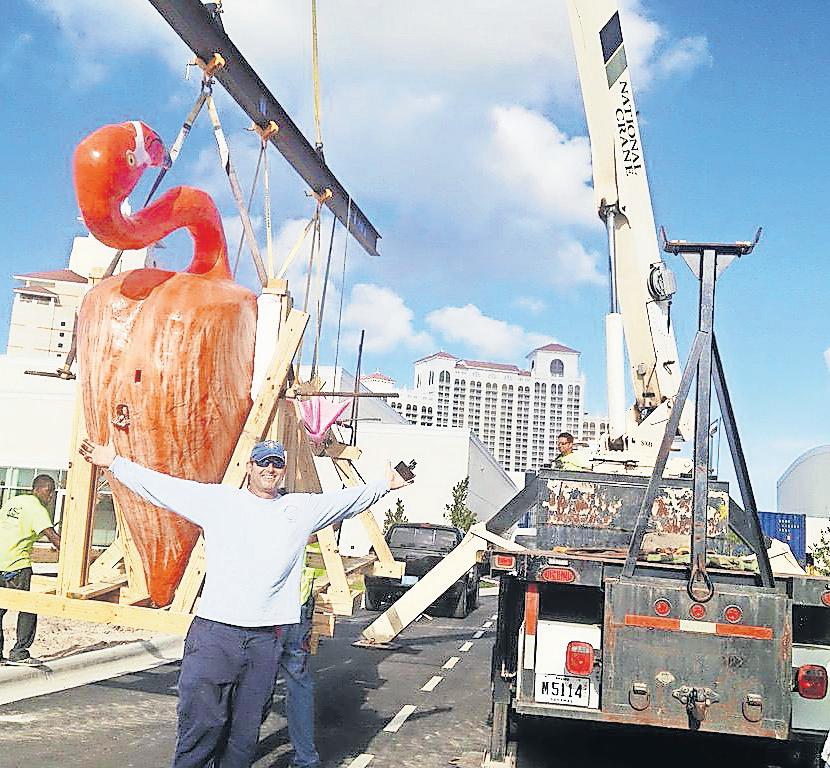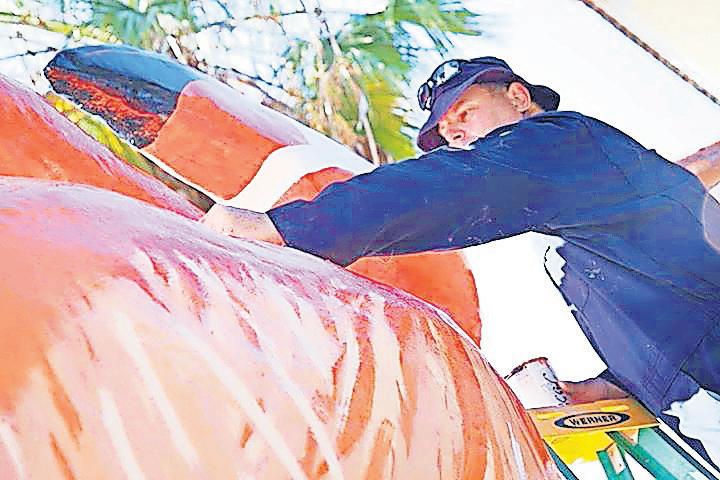hoUSe & hoMe









By LEANDRA ROLLE Tribune Chief Reporter
lrolle@tribunemedia.net
PARENTS have raised concerns about some Family Island schools a week after the new term began, citing staff shortages, unsanitary facilities, and a lack of “running water” — issues education officials say have been addressed or are inaccurate.
At LN Coakley High School in Exuma, the island’s only high school, parents who spoke to The
JUNKANOO
Tribune painted a grim picture of conditions last week: no principal, “too few” teachers, unclean bathrooms, uncut grass and inconsistent water supply.
One parent said her children were dismissed after only half a day last week because of the poor conditions and lack of staff. However, education officials denied this yesterday, insisting the school was not dismissed for these reasons.
“They sit inside the
By LEANDRA ROLLE Tribune Chief Reporter
lrolle@tribunemedia.net
THE Junkanoo Corporation of New Providence (JCNP) will lift its suspension on all Junkanoo activities beginning today,

a move that comes as the registration deadline for government seed funding approaches.
The confirmation came after JCNP deputy chairman Nathan Taylor told

Haitians flee Andros shanty town as officials
By LEANDRA ROLLE Tribune Chief Reporter lrolle@tribunemedia.net
AN estimated 20 shanty town residents in Andros fled from authorities last week after the Ministry
of Works issued eviction notices on structures there as part of the government’s ongoing crackdown on illegal settlements. The 28-day notices were posted on 80 homes in an area in North Andros
known as “Heastie Farms” by the Unregulated Community in Action Taskforce. Michelle Collie, chief social worker, confirmed that a team from Social
By PAVEL BAILEY Tribune Staff Reporter Pbailey@tribunemedia.net
TOBY Smith, the sculptor behind the flamingo statue at the JFK roundabout, has accused Baha Mar of “bastardising” his work after the resort repainted the piece without his input and erased his signature.
Mr Smith, who created Ringo the Flamingo in 2015
when he was commissioned by the resort, said he felt betrayed after learning he would not be included in the repainting despite offering since last November to carry out the restoration for free.
“I think it’s disrespectful and I think it’s disingenuous,” he said yesterday. “And I think coming from


By JADE RUSSELL Tribune Staff Reporter jrussell@tribunemedia.net
BOATERS who treat the Bahamas Air Sea Rescue Association (BASRA) like a towing service are putting lives at risk, according to operations manager Chris Lloyd, who said the misuse has already cost the organisation valuable volunteers.
His warning comes as BASRA prepared to host a maritime safety expo on Friday in partnership with the United States Coast Guard and the Royal Bahamas Defence Force.
“We actually lost a lot of good volunteers by calling them out of their jobs and going and meeting a boat
just needing a tow,” Mr Lloyd said on Friday. “One thing that I really focus on is vetting the situation; even to save the Defence Force and the Coast Guard getting involved, that it is a genuine distress.”
He recalled being called for fuel runs and other preventable problems. BASRA, which relies on one main vessel in New Providence for missions across the country, now avoids launching automatically, instead leaning on nearby volunteers when possible.
“We used to go and deal with every single broken down jet ski,” he said, calling that approach “insane” and unsustainable.
Volunteers, he added, often received no thanks or donations for their time.
Mr Lloyd urged boaters to take responsibility by equipping vessels with radios, life jackets, flares, and other basic tools. He noted that even improvised items could prove lifesaving, such as using a soda can to reflect light or a burning mop head to produce smoke visible for miles.
“The smoke, that’s going to attract every pilot and every boat within 15 miles,” he said. “Rather than sending boats out searching willy nilly, burning fuel, you know, at the end of the day, you spent ten grand.”






By LEANDRA ROLLE Tribune Chief Reporter lrolle@tribunemedia.net
FREE National Move-
ment Senator Michela Barnett-Ellis and women’s rights group Equality
Bahamas have condemned comments by former Progressive Liberal Party MP Leslie Miller, calling his description of her as a “little young girl” both misogynistic and emblematic of the wider barriers Bahamian women face in politics.
Mr Miller made the remark while voicing support for former Prime Minister Dr Hubert Minnis’ bid to run again in Killarney, criticising the FNM’s choice of Mrs BarnettEllis as its candidate. After backlash, he apologised on Friday, insisting he did not intend to offend.
Mrs Barnett-Ellis, however, said his comments were an insult to all Bahamian women. “For a former Cabinet Minister to belittle me in this way is not only disrespectful to me, it is disrespectful to every Bahamian woman who has worked hard, earned her place, and stepped forward to serve,” she said on Facebook. “This is misogyny, plain and simple. And it is exactly this type of tired, small-minded thinking that has held The Bahamas back for far too long.”
Equality Bahamas said Mr Miller’s words reinforced “ignorant, harmful ideas about women” and reflected systemic
misogyny in political and public life. “Direct genderbased attacks on women in frontline politics and failure to rebuke them foster an environment of violence and inequality,” said Alicia Wallace, the group’s director. She noted that only 18 percent of Bahamian parliamentarians are women, a figure that demonstrates the lack of commitment from political parties to advance gender equality.
The group highlighted the Bahamas’ ratification of the Convention on the Elimination of All Forms of Discrimination against Women (CEDAW) and urged authorities to fulfill their obligations. It also cited the UN committee’s 2024 General Recommendation 40, which calls on states to adopt legislation to prevent sexism and misogyny and ensure parity in leadership roles.
“The leaders of all political parties—particularly those relying on the support of women—ought to take such action that Miller is the last to make careless, disrespectful remarks about women, of any age, exercising the right to participate in frontline politics,” Ms Wallace said. Mrs Barnett-Ellis, 43, a mother and attorney with nearly two decades of experience, said she will not be deterred. “To every woman and every girl watching this, know this: your contributions matter, your voice matters, and your leadership matters,”

she said. “This moment is proof of why the fight for respect and equality in politics must continue.
And this is exactly why I am running to represent Killarney.”
She added: “The Bahamas deserves better than this backward rhetoric. We deserve leadership that debates ideas on merit,
not on gender. That is the standard I will uphold, and that is the change I will fight for.”
THE Free National Movement yesterday accused the Davis administration of failing to provide Bahamians with a clear plan after the United States designated its Nassau embassy as a processing site for Haitian nationals seeking immigrant visas.
“Bahamians are troubled by the recent announcement,” the party said, adding that what has been heard so far from the government is “woefully inadequate”.
The FNM said Prime Minister Philip “Brave”
Davis’ assurance that Haitian nationals would not be allowed into The Bahamas “for the purpose of applying for a US visa” does nothing to address concerns about how the designation will affect this country.
“That line does nothing to reassure Bahamians that the administration has an actual plan,” the statement said. “It fails to explain how the government will manage the operational impact of being designated a processing post.”
The opposition said the
government has ignored immigration concerns for too long, pointing to a promised review in 2023 that never materialised, politically motivated shake-ups in the Department of Immigration, and the release of lawbreakers back to work.
The criticism came as the government sought to calm public anxiety after the US announced that, beginning November 1, Haitian immigrant visa applications will be processed in Nassau due to worsening instability in Haiti.
By LEANDRA ROLLE Tribune Chief Reporter
FORMER Doctors Hospital chief executive
Charles Sealy will not offer himself as a Progressive Liberal Party (PLP) candidate in the upcoming general election, despite previously expressing interest in frontline politics.
In a statement released over the weekend, Mr Sealy said his decision was made after much reflection and prayer and guided by “abiding respect for decency, fairness, and what is best for the common good.”
His announcement comes just weeks after he attended the PLP’s mandatory training module for aspiring candidates.
Interest in Mr Sealy also grew after his name surfaced as a possible contender for the PLP’s nomination in Golden Isles — a seat that will no longer be contested by sitting MP Vaughn Miller.
Mr Miller, who earlier this year announced his intention to seek re-election, told The Nassau Guardian that he had long informed Prime Minister Philip Davis and the constituency branch of his decision to step aside.
However, Golden Isles branch chairman Henrico Ellis told The Tribune last week that he had not received confirmation from Mr Miller but expected the matter to be addressed

at an upcoming branch meeting. It remains unclear who will emerge as the PLP’s frontrunner for the constituency, but Mr Sealy expressed gratitude to those who supported his potential candidacy.
He insisted that his ambition to enter Parliament has not changed, saying the question is not “when” but not “if.” Still, he stressed that nation-building is not confined to politics, but also takes place in churches, schools and other parts of society.
He added: “I believe there are many men and women who have worked tirelessly and faithfully in
the Progressive Liberal Party (PLP) and for our country over the years. They deserve the opportunity to step forward and to serve the Bahamian people in this capacity. My time will come; well deserved and most appropriately and I am prepared to serve my party in other capacities.”
“I am deeply grateful for the encouragement and support I have received from so many along my life’s journey. I remain committed to being a nation builder, and I will continue to do my part to strengthen our communities and help build a better Bahama land for future generations.”
The Office of the Prime Minister insisted the policy “will result in no additional entries to The Bahamas for the purpose of US visa applications,” stressing that Haitian nationals are barred from entering the US under measures introduced by President Donald Trump earlier this year.
Speaking in Exuma last week, Mr Davis said The Bahamas will not be “used” for visa processing. “We are not going to be just used for the purposes of allowing… because what happens if
someone comes here and that visa is denied?” he said.
“There’s no need to come to The Bahamas. Visas, you can go online and apply, and if you meet the criteria, it could be done.”
He added that Haitian nationals already need Bahamian visas to enter this country, and that stricter entry requirements have been under review for months.
Immigration rights activist Louby Georges urged people not to conflate Haitian visa applicants with
irregular migrants, stressing that the two groups are distinct.
Haiti’s worsening turmoil, marked by the 2021 assassination of President Jovenel Moïse and the rise of armed gangs, has displaced more than a million people and forced the suspension of visa services in Port-au-Prince. Last night the PLP issued a statement reiterating the government’s position that Haitians will not be allowed enter the Bahamas to apply for a US visa.

By JADE RUSSELL Tribune Staff Reporter jrussell@tribunemedai.net
WITH a week-long Cyber Safety series set to begin on September 14, child advocate Alexandra Maillis-Lynch is warning that stronger safeguards are urgently needed to protect children from harmful video games, websites, and online platforms that exploit and emotionally harm them. Mrs Maillis-Lynch, founder of the National
Society for the Protection of the Children of The Bahamas, said children remain among the most vulnerable to online threats, while parents are often unaware of the dangerous content they can access through group chats and websites.
She recalled that while working at Ranfurly Homes for Children, officials banned youngsters from playing the video game Roblox after learning some users were being exposed to pornographic
material. Cyberbullying, she added, is another growing concern. “If a child is being told every day, you’re ugly, you should die. You know what that does to their brain?” she asked. “As a parent, you would not let your child ever be exposed to that knowingly.”
The Cyber Safety series, hosted by the Annunciation Greek Orthodox Church in partnership with community groups, runs from September 14 to 21 and will focus on raising
awareness among teachers, parents, students, church leaders, coaches, and the wider public. Workshops will address cyber threats to children, human and sex trafficking, child pornography, sexual exploitation, cyber violence, professional cheating, the misuse of artificial intelligence, financial crimes, and the dark web. Cyber Safety Consulting, a US-based organisation that delivers its Cyber Awareness and Safety Education (CASE)
curriculum in schools across America, will lead several sessions.
Rev Dr Fr Peter J Spiro, a Greek Orthodox priest with more than two decades of law enforcement experience, will also speak on human trafficking. He currently works with the Tennessee Bureau of Investigation’s Human Trafficking Unit as a trainer.
Mrs Maillis-Lynch said she hopes the initiative highlights the risks facing both children and adults.
She warned that as the internet evolves, children and the elderly are becoming increasingly vulnerable to exploitation. Partners for the event include Women United, the Bahamas Union of Teachers, Boost Academy, and the Bahamas Christian Council. The Ministry of Education, the US Embassy, the Royal Bahamas Police Force’s Cybercrime Unit, and the Ministry of National Security have also been invited to participate.
BAHAMAS Power and Light (BPL) staff in Abaco gathered last week for a memorial seminar honouring the memory of Hurricane Dorian while focusing on recovery, resilience, and healing.
The event brought together employees, union representatives, and wellness professionals to reflect on the storm’s devastating impact and to support staff who continue to live with its effects, according to a press release from BPL.
BPL chief executive officer Toni Seymour delivered opening remarks, affirming the company’s commitment to the Abaco community and to the wellbeing of employees. She shared her personal experience of facing Dorian in Grand Bahama, describing the fear and uncertainty that mirrored what many in Abaco endured.
“Some of you were at work, worried about your families at home. Some of you were at home, not knowing if you would survive, not knowing if you would be able to save
your family if it came to that,” Ms Seymour said.
“These are the types of things that I know you all experienced. And while it’s difficult to relive those memories, there is healing in it as well.”
Human resources director Daphne Simmons and Bahamas Electrical Workers Union president Kyle Wilson also addressed staff, underscoring the importance of compassion and solidarity. “No one is more responsible for the bounce back on this island than each and every one of you in here,” Mr Wilson said. “Because without energy, nothing happens. You stood strong, and despite everything, you answered the call for the people who depended on you.”
The seminar highlighted health and wellness as key aspects of long-term recovery. Zanda Bonamy, director of health, safety, and environment, introduced BPL’s new Health and Wellness Team, which led a session on mental health facilitated


by clinical psychologist Dr Wendy Fernander and nurse Nicole Major.
“We saw that many staff still suffered from PTSD or felt afraid during storms because of what they experienced during Hurricane Dorian,” Ms Bonamy said. “With the recent launch of our Health and Wellness Department, we wanted to be here in Abaco at this memorial seminar to let staff know that we are here to support them.”
Employees participated in activities focused on mindfulness, resilience, and coping strategies for post-traumatic stress, before concluding the day with a panel discussion and Q&A session.
BPL chaplain Nelson Strachan also offered words of encouragement, urging staff to draw strength from faith and community.
The company said it remains committed not only to restoring power but also to supporting the mental and emotional well-being of its employees and the wider community.




MIGRANTS from page one
Services accompanied officials to explain the purpose of the exercise and help residents seek alternative housing.
She said the team spoke with one Bahamian, but many people were not at home during the exercise.
Superintendent Stephen Carey, head of the task force, said three undocumented migrants were arrested after attempting to flee when the notices were posted.
He estimated about 20 people ran in total, most escaping.
He said this latest action underscores the taks force’s commitment to dismantling unregulated developments and urged the public to call the taskforce’s hotline with information.
“The Unregulated Communities task force is serious about their task in getting rid of all unregulated structures in the commonwealth of The Bahamas,” he said. “We will be going through The Bahamas identifying locations where they have structures that are unregulated.”
Craig Delancey, building controls officer, did not give a timeline for demolition, saying the task force would await further instructions before proceeding.
The demolition of shanty towns has long been a contentious issue.
Successive governments have cited health concerns, illegal land use, and building code violations to justify the removals, yet critics argue the approach lacks compassion and fails to address housing shortages.
Since ramping up efforts in November 2023, the Davis administration has reported the demolition of more than 500 unregulated structures across several islands.
In New Providence, communities such as Kool Acres, All Saints Way, Montgomery and parts of Coral Harbour have been cleared.
In Abaco, officials identified more than 500 illegal structures — over 150 of which have been removed, with roughly 240 remaining in one settlement. On Eleuthera, 184 out of 216 structures have been cleared.



A US official has claimed The Bahamas has “relaxed a lot” of its immigration enforcement after the arrest of a group of Bahamians in attempted human smuggling incidents near Florida.
St Lucie County Sheriff Richard Del Toro made the claim while describing last month’s operation in an interview with American media.
He said partners at the DEA received intelligence that several boats were coming from The Bahamas carrying large amounts of cocaine and undocumented immigrants.
He said: “So working with our partners, we set up an operation over the weekend, and all came about. We got three vessels and 30 undocumented Chinese nationals and 168 kilos of cocaine.” Last week, The Tribune reported that five Bahamians, along with 30 Chinese nationals, were intercepted by US Coast Guard officials in separate attempted human smuggling incidents off Florida. Two of the Chinese nationals were said to be minors. According to reports, three other Bahamian men allegedly involved in countersurveillance were arrested in Florida. Mugshots of the men, some of whom are from Abaco, were widely shared on social media.
smuggle drugs and people into the US.
The next day, on August 30, authorities spotted two suspect vessels leaving the Fort Pierce Inlet. Later that day, they learned of a third boat involved, with all three returning from The Bahamas.
Sheriff Del Toro said of the operation: “Since President Trump’s gotten into office, southern border obviously has been shut down so people are going to find other ways, like water, people finding the path of least resistance”
US authorities said the operation began after they received intelligence that an Airbnb in Fort Pierce had been rented by a group of men planning to travel to The Bahamas to
“So what we’ve seen is The Bahamas has really relaxed a lot of their immigration and so people are going there as kind of a launching point to get here to the United States.”
By EARYEL BOWLEG Tribune Staff Reporter
ebowleg@tribunemedia.net
EXPECT more rainy days ahead, with forecasters warning that heavy downpours will soak parts of The Bahamas next week after several days of relentless showers and flooding. The Department of Meteorology said northern islands, including Grand Bahama, Abaco, Bimini, and the Berry Islands, could see two to four inches of rain. New Providence is forecast to receive one to
two inches. Jeffrey Simmons, director of the Department of Meteorology, told The Tribune that conditions in the northern islands will remain unsettled through Wednesday.
“There’s gonna be some periods of heavy rainfall, then some light, and some nice sunny times,” he said. “Some islands are gonna be more intense than others.”
Mr Simmons explained the unsettled weather is linked to a frontal boundary that has lingered over South Florida and the
northern Bahamas for about a week.
A Friday evening forecast from the Department said a stationary front and moist, unstable air will continue to trigger showers and thunderstorms across the Northern and Northwestern Bahamas on September 5 and 6.
While the front is expected to drift north over the weekend and high pressure builds in, lingering moisture and troughing will still fuel scattered showers and storms in the north into next week.

NULLIUS ADDICTUS JURARE IN VERBA MAGISTRI
“Being Bound to Swear to The Dogmas of No Master”
LEON E. H. DUPUCH
Publisher/Editor 1903-1914
SIR ETIENNE DUPUCH, Kt., O.B.E., K.M., K.C.S.G., (Hon.) LL.D., D.Litt .
Publisher/Editor 1919-1972
Contributing Editor 1972-1991
RT HON EILEEN DUPUCH CARRON, C.M.G., M.S., B.A., LL.B.
Publisher/Editor 1972-
Published daily Monday to Friday
Shirley & Deveaux Streets, Nassau, Bahamas N3207
TELEPHONES
News & General Information
(242) 502-2350
Advertising Manager (242) 502-2394
Circulation Department (242) 502-2386
Nassau fax (242) 328-2398
Freeport, Grand Bahama (242)-352-6608
Freeport fax (242) 352-9348
WEBSITE, TWITTER & FACEBOOK
www.tribune242.com


THE consequences of our actions can often be bigger than we think.
One of the latest examples of that is the actions of boaters who fail to plan properly and then fall back on rescuers to save them.
The Bahamas Air Sea Rescue Association (BASRA) does life-saving work – so when operations manager Chris Lloyd warns of the dangers of boaters treating them like a towing service, people ought to listen.
He says the service has lost volunteers because of occasions when a rescue has been called for – only to discover when they arrive at the boat in need of assistance, what it really needs is more fuel.
“We actually lost a lot of good volunteers by calling them out of their jobs and going and meeting a boat just needing a tow,” he said.
In today’s Tribune, Mr Lloyd gives plenty of tips for boaters to try to make sure they can summon help if they really need it – but the biggest tip of all is to plan in advance and be prepared.
Boaters should also consider that if they are calling for rescue, they might well be depriving someone else of aid who might need it more – BASRA has one main vessel to cover the whole of The Bahamas. In real need? Absolutely, call for help. But do all you can to stop yourself being in danger in the first place – prepare your boat, fuel up and do not let your failings fall on the shoulders of others.
Driving volunteers away from the likes of BASRA who feel frustrated at being treated like a taxi service is one thing, but earlier this year we heard of another situation driving people away from signing up for the Royal Bahamas
Defence Force (RBDF).
The accusations of abuse at a Rangers camp have ended up in the courts – but how such a situation came to exist in the first place raised other questions. The courts will have their say on whether or not the actions at the Eleuthera summer camp were criminal or not – but RBDF Commodore Floyd Moxey last week assured that there had also been changes made to the Rangers programme in light of those accusations.
He assured: “It is a programme that shall not fail.”
Each of the cases above shows the deterrent factor – whether it from people being treated without respect, or with potential criminality. The outcome is the same – driving people away from something they willingly took part in, something that was important to them, that they gave their time and energy to.
And that matter of respect is at the heart of it all. That respect can be to the officers who come out to serve, it can be to the badge that they wear, it can be to the other members of our society –but those who fail to show that respect undermine the very foundations of such organisations.
In the case of the Rangers, there has been reform, we are told. In the case of individual boaters, who can lead such reform? That falls on the boaters themselves.
So make your own pledge – to not make the lives harder of rescuers, be it BASRA, firefighters, police officers, RBDF personnel, lifeguards or whoever it might be.
Do your part – so that they are less likely to have to do theirs.
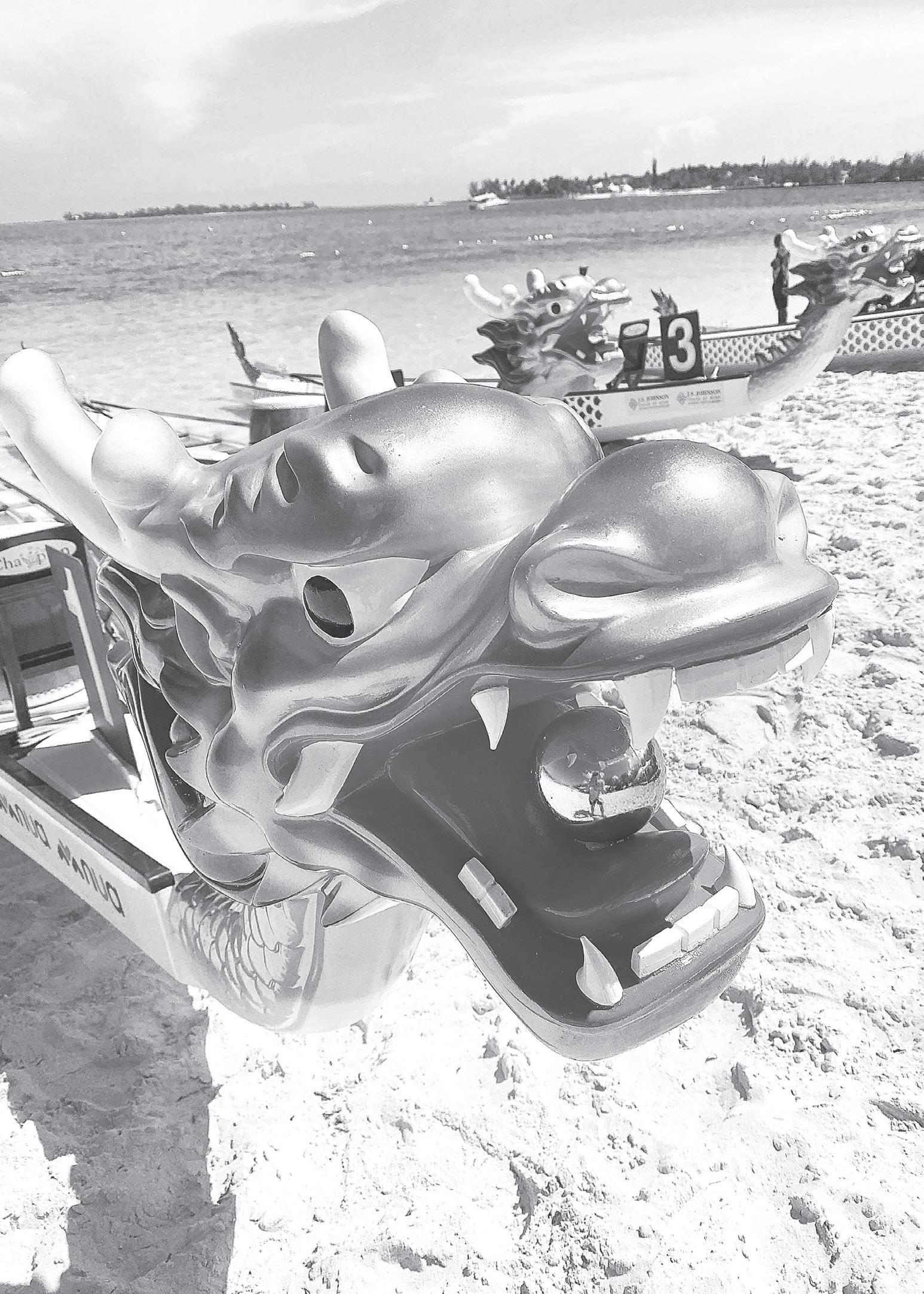

EDITOR, The Tribune, TODAY, the world observes International Literacy Day under the theme “Promoting literacy in the digital era.” It is a timely reminder that while technology can enrich learning, it can also create new barriers. While it puts entire libraries in our hands, connects loved ones throughout the Family Islands, and opens doors to the world, it also threatens to replace deep reading and imagination with distraction, as brightly coloured apps and endless scrolling compete with traditional books for our children’s attention.
Yet even as we embrace the benefits of technology, we must remember that not every child has access to a device or reliable internet. For too many families, the digital era is not a bridge but a barrier. While some children enjoy the latest tablets and constant connectivity, others are left with outdated materials, or nothing at all. This digital divide threatens to widen inequality even more than income gaps. However, literacy itself is the greatest barrier because a child who cannot read with confidence will be locked out of opportunity, device or no device.
That is why literacy, both traditional and digital, is essential. Digital literacy helps us evaluate information, guard against misinformation, and use technology responsibly. Traditional literacy (reading, writing, and comprehension) is at the foundation of it all. The two must work together if we want a Bahamas that can compete and thrive.
This cause is personal to me. I am the daughter of a teacher, and I grew up knowing that reading is not just a pastime but a pathway to dignity and opportunity. Some of my
happiest moments are spent in classrooms reading to children or recording stories for virtual story time. As I have done for many years, I will once again visit multiple school campuses today because for me this is not symbolic, it is a standing commitment.
I encourage Bahamians everywhere to read: books and newspapers, road signs, scripture, poetry, labels in the grocery store, even thoughtful posts online. Parents, please push your children to read and manage their screen time. Protect their eyes, brains, and social skills. If a child does not answer right away when called or reacts with irritation, that may be a sign of overexposure to devices. Step in with love and structure. We must also remember that there are adults among us who are illiterate or moderately literate. You may notice it when someone hesitates to order food, avoids filling out a form, or quietly asks for help in the grocery store. This is not a shame to be mocked but a need to be met with compassion. There are countless stories of men and women who have overcome personal struggles, family hardships, and poverty itself through literacy and learning. Books have launched careers, broken cycles of disadvantage, and changed lives. As someone who has devoted my professional life to the field of communication, I know that words shape worlds. Literacy is the foundation of every exchange of ideas and every national conversation.
That is why the government must aggressively invest in schools, libraries, and teacher training. Parents must nurture reading habits at home. Churches and civic groups must open their doors to reading circles, book exchanges and adult literacy programmes. Employers must encourage training for workers. We all have a role to play so get involved by reading with a child, donating a book, or supporting someone who struggles.
I love this country, and I love its children most of all. Let us give them, and ourselves, the one gift that no one can ever take away: the power to read the world and the courage to write our own story because reading and writing cannot be separated. When we write, we create something worth reading. When we read, we sharpen our ability to write and to tell our story. We need to produce literature that looks like us, sound like us, and honours who we are. We need children’s books with illustrations that reflect their faces and their worlds. We need histories written from our perspective, not borrowed from others. That is the true meaning of literacy, not only consuming words, but producing them; not only learning from the pages of others, but filling pages of our own, whether on paper or on screen. Literacy is not just a skill, it is identity, freedom, and the key to unlocking doors in a Bahamas for all Bahamians.
SENATOR MAXINE SEYMOUR
Shadow Minister for Social Services, Information, and Broadcasting Nassau, Bahamas September 8, 2025
EDITOR, The Tribune.
WE recently had some stats from the police which seemed pretty good, but to complement those numbers, it would be good if somebody from now on, going forward, kindly do the following, and I now ask, for the last six months:
How many arrests did we have?
How many people were charged?
How many were convicted?
How many were jailed?
How many plea bargains?
How many of those jailed were redivide?
How many of the prison population are on the day release work programme?
When the records are expunged and they break their agreement, I hope
they are appropriately penalised. I will flush out any MP or whoever makes the magical call that used to be made, Saying, he didn’t do that, he would never do that, let him go. Children visits yes I agree. Privilege to attend relative’s funeral, no, that is a vital part of the punishment. We have to be serious if we are going to do break the cycle of criminality.
I had need on Wednesday to call the Criminal Records
Office, 919 gave me one no, endless ringing no answer, called 919 again, I was given two new number, endless ringing no answer, from one no, the other no, somebody answered, he said wrong department, he gave me another no. endless ringing,
called 919 again, she gave me two numbers, endless ringing. Minimum of 30 minutes effort wasted. Would somebody who ever is in charge of communications please get the phones fixed, please that is an indictment on the Police Department. Whoever is in charge of the fire department, that person needs to be removed from the jurisdiction of the Commissioner Of Police and needs to be a Commissioner in his or her own right, in charge of the Police Department with their own budget. Please let this be dealt with as a matter of urgency.
THE CRITICAL Nassau, August 29, 2025.
homeroom and do nothing,” the parent said. “I’ve never seen it like this. The whole of last week, there was no bus because the bus break down so the parents had to drop their children off to school or they had to hike ride.”
Photos and videos shared on social media showed toilets filled with faeces and filthy bathrooms.
While officials claim some of the images were outdated, parents insist they accurately reflect current conditions at LN Coakley.
Other parents warned the unsanitary state of the facilities could put female students at risk of infection.
“It’s not a safe space for them to be in,” another parent added.
Parents, who visited the school yesterday, also found that toilets were still not flushing.
FNM candidate for Exuma and Ragged Island
Debra Moxey-Rolle yesterday accused the government of neglecting schools in the area and demanded answers.
However, education officials pushed back yesterday, insisting that schools are not being neglected and that some issues have already been addressed.
Don Barr, the island’s district superintendent, confirmed the school was dismissed early twice last week — once for an administration orientation and another due to a temporary water outage caused by a lightning strike.
He said the water supply has since been restored and the school premises remain clean.
He said a small portion of the grounds that had uncut grass was trimmed yesterday.
Education Director Dominique McCartney-Russell also supported his claims, attributing the water disruption to bad weather.
Officials added that water was only off once last week, contradicting parents’ claims.
Mrs McCartney-Russell said the school’s water pump had long-standing issues and assured that efforts are underway to replace it soon.
Regarding staff shortages, she said only “one or two” teaching positions remain unfilled, but interviews were conducted last week and efforts are ongoing to address the gaps.
Nonetheless, the situation
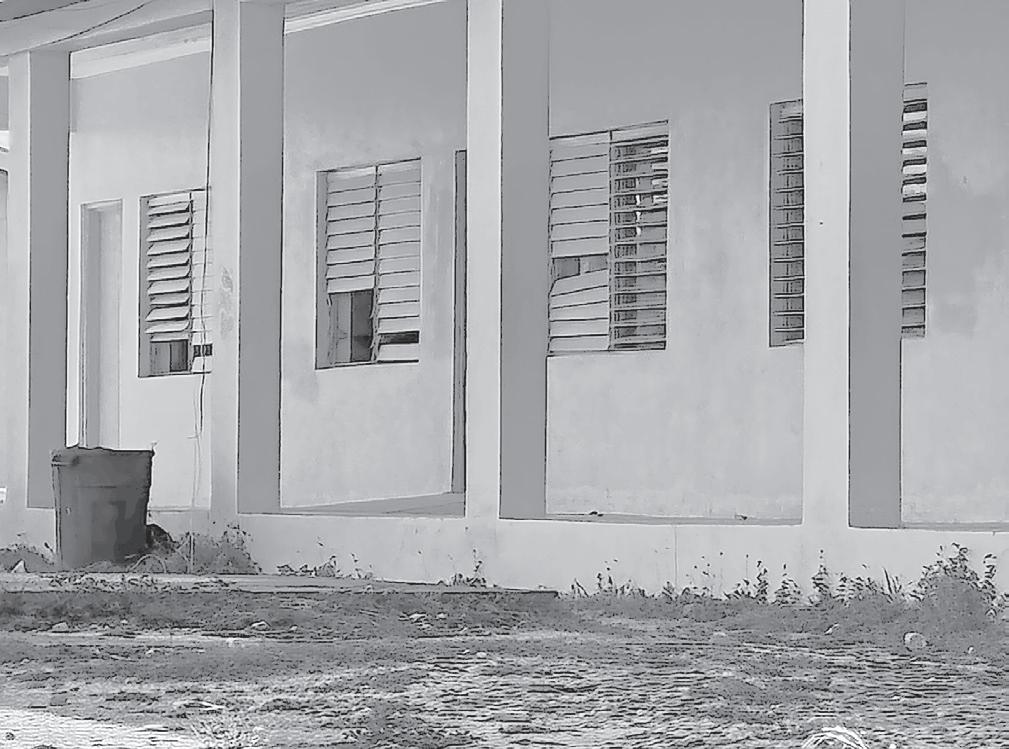
has reignited concerns about the state of school preparedness.
Last week, Bahamas Union of Teachers (BUT) president Belinda Wilson warned widespread delays and inefficiencies have left both teachers and students unprepared for the new school year. Her concerns followed strike action taken by Bahamas Education Managerial Union (BEMU) in protest of unresolved disputes over allowances, promotions, and transfers.
Government officials have since said they are working to fill vacant principal and senior administrator positions in several schools.
But parents argue the issues should have been addressed before the reopening and say they are tired of “empty talk”. Meanwhile, some have linked staff shortages on the Family Islands to the lack of affordable housing in those communities. However, officials have not confirmed this.
On Eleuthera, some parents told The Tribune they felt “neglected”.
Others described the school problems as a legacy issue that successive administrations have failed to resolve.
“It doesn’t make sense, but it’s nothing strange. We went through this last year. There’s nowhere to lay blame here,” said Joshua Higgs, a parent in Spanish Wells.
Meanwhile, Leranda Johnson, former vice president of the Laura L Anderson Primary PTA, said schools in North Eleuthera opened with challenges including staff shortages, inadequate lighting and security fences, unclean facilities, electrical

By KEILE CAMPBELL Tribune Staff Reporter
kcampbell@tribunemedia.net
A 36-YEAR-OLD man was remanded to prison on Friday after he was accused of assaulting another man with a cutlass during an incident on Taylor Street in February.
Prosecutors alleged that on February 27, 2025, Stefano Gibson assaulted Phillip Miller with the weapon. Police told the court that Gibson was not immediately taken into custody after the matter and was only arrested some time later.
The prosecution further noted that Gibson had prior offences within recent years and argued this was sufficient reason to deny him bail.
Appearing before Senior Magistrate Anishka Isaacs, Gibson pleaded for leniency, saying he had changed since his past run-ins with the law. He told the court that he has two young children, aged five and two, and a family to care for. He also claimed he acted in self-defence during the altercation with Miller. Magistrate Isaacs raised concern over whether Gibson would return for future proceedings if released on bail. She ordered that he be remanded to the Bahamas Department of Correctional Services; he is scheduled to return to court on September 23. Before being led away, Gibson remarked that his daughter’s birthday falls on September 20.
Still, Mrs Johnson said some of these problems persisted from last year and remain unresolved, despite Education Minister Glenys Hanna Martin’s public assurance that schools were ready for reopening.
Mrs Johnson questioned why contractors were still removing junk and debris from campuses last week if schools were truly prepared.
She also stressed parents and staff shouldn’t have to appeal for basic items like bleach and tissue, and the ministry should have ensured schools were properly stocked.
problems, no classroom fans, limited cleaning supplies, insufficient janitorial staff, and no principal.
However, The Tribune understands the janitorial shortage has been resolved, with cleaning supplies recently delivered to Eleuthera to be shared across schools on the island.
“Communication from staff and leadership is poor, the attitudes are unpleasant and discouraging with basic questions left unanswered and parents made to feel dismissed,” she said. “Where is the diplomacy and mutual respect in our schools these days? As a mother and strong supporter of the school, I am at my wit’s end with the empty promises and
lack of accountability.”
She said parents are scheduled to meet with the minister via Zoom today and added she remains optimistic but skeptical because “we know how politics work”.
She said parents are tired of empty talk but want action.
“We are nauseous of the pageantry meant to pacify us and insult our intelligence, while we are once again sent on a wild goose chase,” she said. “We find ourselves caught between wanting better conditions for teachers, staff, and especially students, and fearing the consequences of victimisation that might fall on our children.”
In Spanish Wells, parents reported facing similar challenges at the start of the school year, though some have since been resolved.
However, he noted most of the issues have now been addressed, with teachers transferred to fill the gaps and a senior mistress stepping in to provide leadership.
“So far, everything’s come to pass. I don’t think there’s an exact timeline for a principal, but the minister herself is dealing with that so we can’t ask for much more than that,” he said.
He acknowledged the need for reform in the education sector and linked some of the ongoing staff shortages to insufficient rental assistance.
He said a highly qualified teacher left the island due to low rental allowances, adding rental support for teachers is limited and housing costs on the island remain high.
“It’s a ministry-wide issue but I think they’re working on doing better with all of that,” he said.
Mr Higgs, who is also the vice president of the Samuel Guy Pinder All-Age PTA, said the school initially opened without a principal and lacked teachers for certain grades.

MONDAY, SEPTEMBER 8, 2025
“...not enough to say ‘we want more women in politics’. The real test is in how the parties position those women. Until women are given winnable seats and full backing, the promise of gender equality in Bahamian politics will remain an empty one.”
- Prodesta Moore

By MALCOLM STRACHAN
A SERIES of separate stories last week showed how seriously – or rather the lack of seriousness with which the current administration takes women.
Equal rights campaigner Prodesta Moore spoke up in a letter in which she called women to be not just given a chance of representation in Parliament, but a fair chance.
Not token measures, but equal representation, with at least 40-50 percent of women candidates, and in constituencies where victory is possible.
She said it is “not enough to say ‘we want more women in politics’. The real test is in how the parties position those women. Until women are given winnable seats and full backing, the promise of gender equality in Bahamian politics will remain an empty one”.
Empty promises might be a fair description of this administration’s approach
to women – with a number of issues affecting women in particular left unresolved or with a lack of will to bring about change. It was not just Prodesta Moore speaking up. She might not have intended her own administration as a target – but the current Speaker of the House, Patricia Deveaux, also spoke on the issues facing women in politics. She said: “There will always be barriers as women, because males are always going to give us a very tough time.”
She was speaking alongside Senate President Lashell Adderley at an event to mark this week’s Commonwealth Parliamentary Association conference. The women’s conference will run alongside the regional meeting – and will put various issues affecting women in the spotlight, so you can expect to hear more on women’s rights and the wrongs visited upon them in the days ahead.
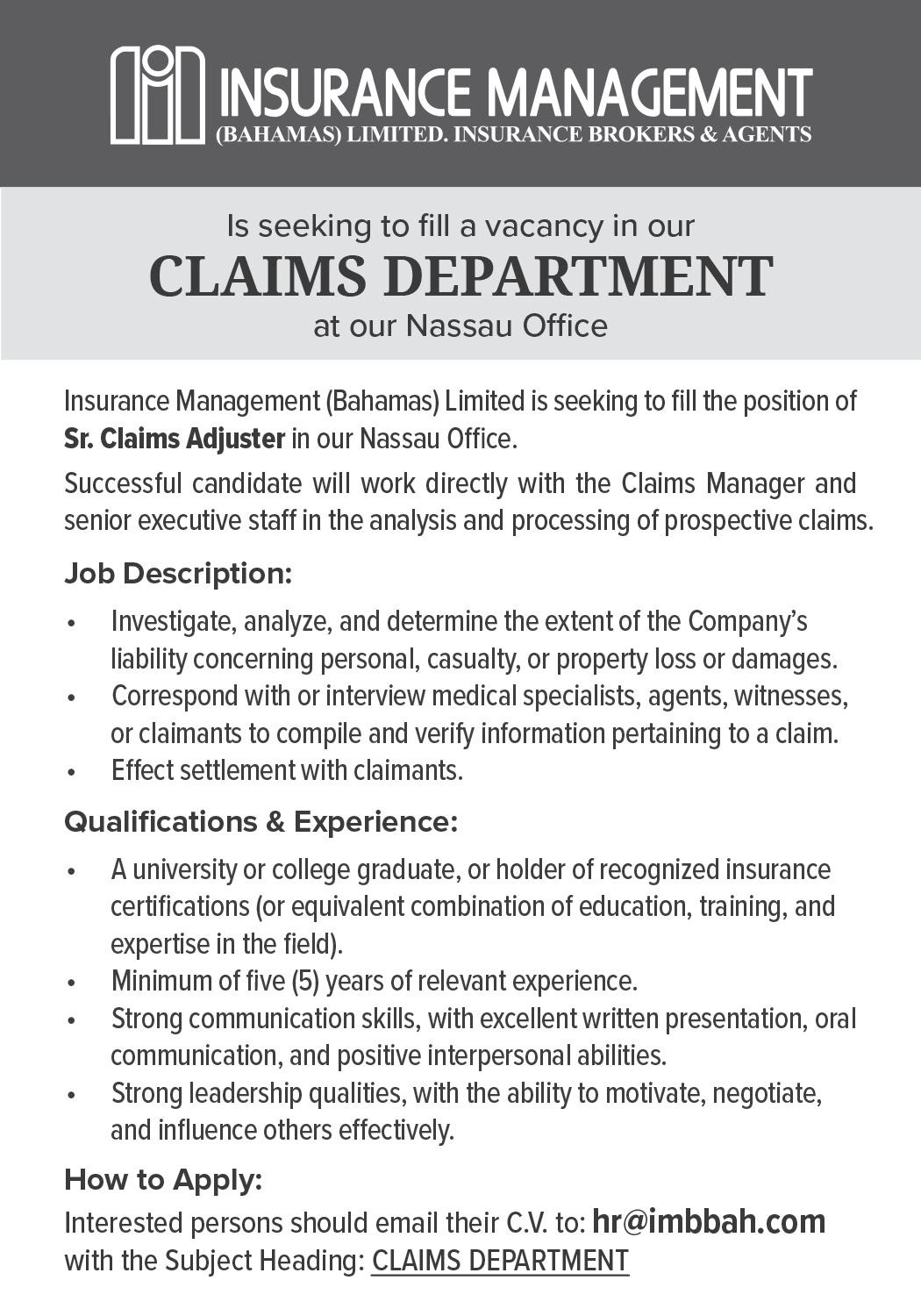
The Senate president spoke of hopes for new women candidates to come forward, saying: “The hope of women all over the world as we see more women take political office is that that growth will be encouraged and continued.”
The reality is that women are seriously underrepresented in this Parliament. There are just seven women out of 39 MPs in total – and yet, that ratio is still a record number of women in Parliament, the previous record being five.
Whether that ratio has anything to do with it or not, this administration has also underwhelmed when it comes to tackling issues affecting women.
Another example appeared last week – with the revelation that this country still cannot carry out DNA testing in-country for rape kits.
As a result, rape victims are left waiting for months for the testing to be carried out at laboratories abroad.
This in turn has a knockon effect for court cases for such crimes.
Women are made to wait for justice after being sexually violated because we cannot prioritise the spending.
Bahamas Crisis Centre director Dr Sandra-Dean Patterson was blunt in her assessment, saying: “We have to prioritise it. The government has many, many needs and very many demands, and everything changes every year. But one thing that is not changing is the incident of sexual violence.”
Why has the government not done anything about such a lab? According to Dr Dean-Patterson, it would be “extremely costly”.
Lots of things in government are extremely costly. Being in government sees you presented with a list of price tags every day. The government chooses to spend on things that are costly all the time. Witness the semi-regular talk for

example of a new Parliament building. That will not be cheap. Is that worth paying for ahead of something that will speed up justice for victims of rape?
As Dr Dean-Patterson says: “We cannot put a price tag on it. We cannot. We need to do all that we can to ensure that victims can feel supported and can feel that they can get justice.”
One of the other areas in which DNA testing may be needed is another area in which women lack equality – citizenship.
Back in February last year, the government said it had finalised its rules for genetic testing for people affected by the 2023 Privy Council ruling on citizenship – which affirmed that those born out of wedlock to Bahamian men are Bahamians at birth regardless of their mother’s nationality.
However, the government said that DNA samples would be part of the process to ensure that these really were the children of Bahamian men and it was not just a case of them saying it was their child.
Again, that requires DNA tests to be completed – and would see those tests sent out of country rather than being able to be dealt with here.
We should of course note that sending these tests to a lab elsewhere also has a cost – so it is not as if we are not spending money on this testing already. But while the government has proceeded – albeit slowly – with finalising rules on citizenship where it affects men, it appears to have completely shelved any action with regards to inequality when it comes to citizenship being passed on by women. Children born to a Bahamian woman and a foreign man are not automatically granted Bahamian citizenship. This is the exact situation the government is finalising protocols for in the case of Bahamian men – but no sign of dealing
with it for women.
Bahamian women also lack the same rights as men in securing citizenship for a foreign spouse.
In this article, we have not even discussed the issue of the lack of legislation over marital rape – despite this administration’s manifesto pledge to uphold pledges with regard to equality, or dealt with the endless delays over even giving straight answers over domestic violence shelters, let alone setting them up. If all of this shows a lack of urgency to treat women with respect and equality, then into the mix comes the loud mouth of Leslie Miller.
When Miller was in Parliament, his misogynistic language saw him “joking” about hitting women – even as he assured Parliament that he was not joking. Nothing was done at the time to really show the government took such behaviour seriously.
Last week, Miller patronisingly called for the PLP not to run in the Killarney constituency. In his comments, he derided the FNM candidate chosen for the seat, Senator Michela Barnett-Ellis, calling her a “little young girl” and criticising “the audacity of her to go there and talk about she want to run the place”. Mrs Barnett-Ellis is 43, and has two decades of legal experience – and there is no place for the kind of language Miller has, and continues, to come out with. What has been the consequence for Miller and his repeated ill treatment of women? In this year’s Independence honours, he was given the title of Companion of the Order of The Bahamas. This administration not only fails to act to benefit women – it actively rewards those who belittle them.
Perhaps it is little wonder there are so few women at the top end of a political process that continues to fail to take them seriously.
By TERRY MILLER
THE National Peace Initiative (NPI) is not simply a framework of policies and programmes - it is a movement, a vision, and a call to reimagine The Bahamas as the safest, most peaceful, and most resilient country in the world. To achieve this transformation, the nation cannot rely on traditional leadership models alone. What is required is creative leadership: bold, visionary, and compassionate leaders who can inspire, innovate, and unite diverse sectors of society around a shared purpose.
Violence in The Bahamas has persisted for decades, fuelled by complex social, economic, and cultural factors. Addressing these issues demands more than incremental change; it requires innovative approaches that cut across disciplines and break away from outdated methods. Creative leadership introduces new tools - whether through art, storytelling, entrepreneurship, or digital technology - that can reach people in ways traditional methods cannot. For example, creative leaders can champion programmes where music, sports, and theatre are used not just for recreation, but as platforms to teach conflict resolution, teamwork, and community pride. By reimagining familiar tools as agents of transformation, creative leadership turns obstacles into opportunities.
The NPI emphasises the necessity of collaboration across government, civil society, business, and faith-based organisations. Yet collaboration often falters when stakeholders cling to silos, protect turf, or distrust one another. Creative leaders excel at building bridges, bringing together unlikely partners to pursue common goals. They understand that while a government ministry may provide funding and policy direction, it is the church that provides moral grounding, businesses that provide jobs, and civil society organisations that provide hands-on outreach. Creative leadership weaves these threads into a single
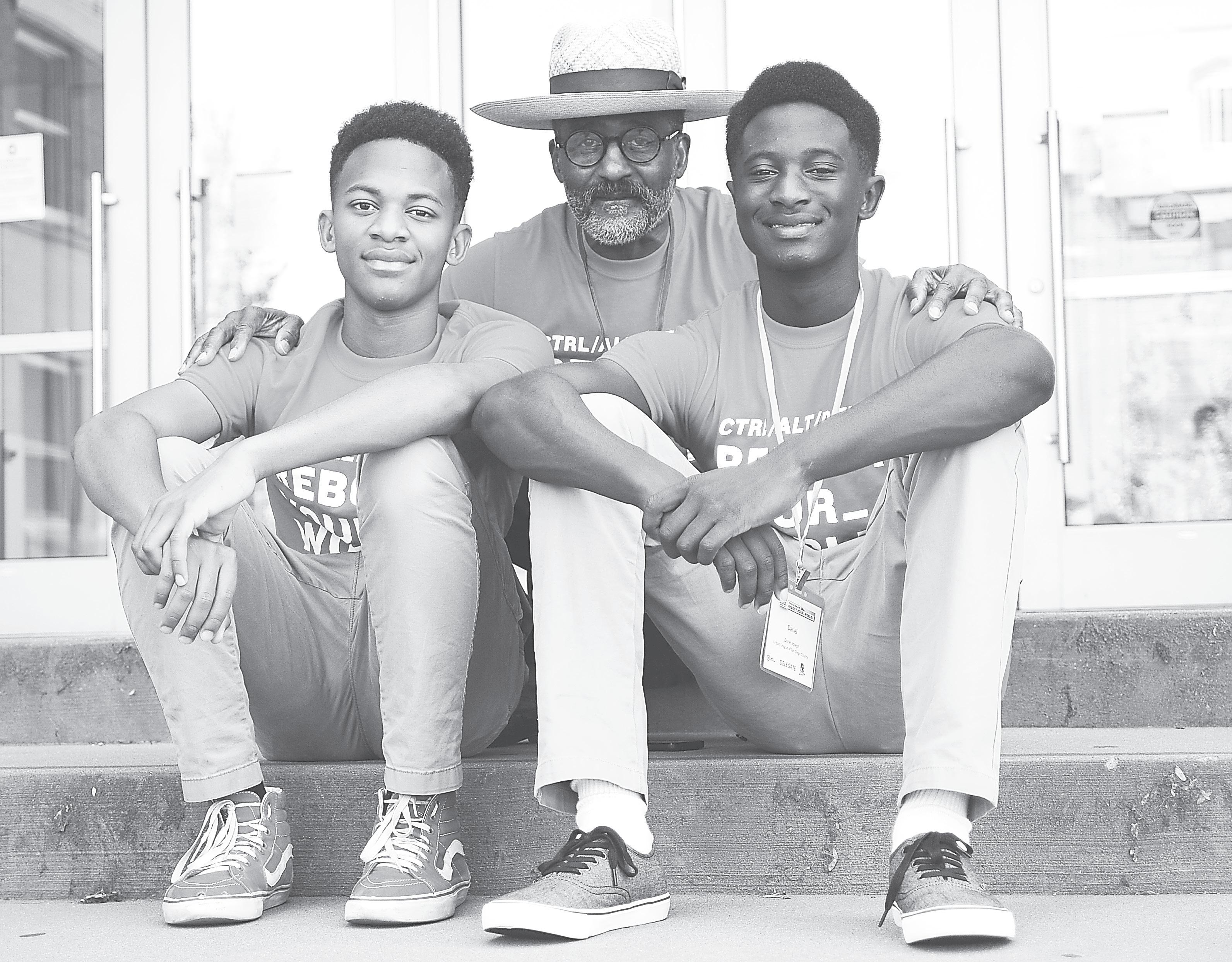
fabric of peace, ensuring no sector works in isolation. The youth of The Bahamas are often portrayed as victims or perpetrators of violence, but creative leadership sees them as partners. Empowering youth means not only offering them programs but giving them a seat at the table. Creative leaders recognise that young people bring fresh perspectives, energy, and cultural relevance to the peacebuilding process. Through mentorship, leadership training, and initiatives like BYBAS - the BASH Youth BuildA-Skill program - youth can become builders of sustainable peace.
Creative leaders empower local neighbourhoods, schools, and churches to take ownership of peacebuilding. They listen to community voices, honour lived experiences, and design interventions that reflect the unique needs of each area.
BYBAS’s holistic model, combining technical skills training with personal development and moral guidance, exemplifies how creative leadership empowers young men to reclaim their futures while contributing to national transformation.
The challenges facing The Bahamas are not static; they evolve with time. From shifting migration patterns to the global rise of cybercrime, from climate change to the

influence of social media, new threats constantly emerge. Creative leadership ensures that the NPI remains a living document - dynamic, flexible, and responsive. Rather than being paralysed by unexpected challenges, creative leaders adapt strategies to meet new realities, whether through community innovation hubs, peace education in schools, or AI-driven early warning systems for violence prevention. Their adaptability ensures that the pursuit of peace is never derailed by changing circumstances. At the core of creative leadership lies the power of example. Leaders who model peace, integrity, and compassion inspire trust and motivate others to follow. In a society where corruption
and cynicism have eroded confidence in institutions, creative leaders demonstrate that leadership rooted in ethics and vision is still possible. Their personal commitment to peace becomes contagious, igniting collective action. When leaders embody the change they seek, they shift the culture from despair to hope, from division to unity.
Creative leadership also plays a vital role in reshaping cultural norms. Violence in The Bahamas has been normalised over decades, with young men often seeing aggression as a path to respect or survival. Changing this requires leaders who can articulate and model a new culture - one where peace, empathy, and cooperation are celebrated. Through media campaigns, arts initiatives, and faith-driven outreach, creative leaders can challenge destructive norms and inspire citizens to embrace values that uplift rather than destroy. No national initiative can succeed without the active participation of communities. Creative leaders empower local neighbourhoods, schools, and churches to take ownership of peacebuilding. They listen to community voices, honour lived experiences, and design
interventions that reflect the unique needs of each area. From neighbourhood peace councils to community mentoring programmes, creative leadership decentralises power and ensures peace is co-owned by those most affected by violence.
The National Peace Initiative is ambitious, but it is achievable. It is not simply about lowering crime statistics; it is about transforming the soul of the nation. Such transformation cannot be commanded - it must be inspired. Creative leadership is the force that inspires. It turns programmes into movements, strategies into lived realities, and visions into legacies. It is the kind of leadership that listens deeply, thinks boldly, and acts compassionately.
If The Bahamas is to stem the tide of violence and rise into its true destiny as a nation of peace and prosperity, it must cultivate, celebrate, and empower creative leaders at every level - from Cabinet offices to classrooms, from boardrooms to pulpits, from neighbourhood councils to family homes. Creative leadership is not a luxury for the NPI. It is its lifeblood, its engine, and its promise of success.

M ENTAL health is no longer hidden in the margins of public life, whether in E urope, N orth A merica, or the Caribbean. It is a growing global reality that costs lives and livelihoods, and prevents social cohesion and economic inclusion.
Yet, while the problem is no longer a secret, its treatment in the Caribbean too often remains one of embarrassed secrecy. E lderly people are institutionalised; younger people are locked away at home or in institutions. Dedicated practitioners do their best, but they lack equipment and medications. A nd there are not enough trained mental health doctors and nurses.
T he World Health Organization WHO) estimates that more than one billion people live with mental-health conditions, and the trend is upward. T he latest official global count is that 727,000 people died by suicide in 2021. In 2023, in the United States alone, 49,316 people died by suicide. Caribbean record-keeping is weak. What little exists often reflects only institutionalized patients, but anyone working in schools, clinics, or courts knows the cases are rising.
Social media is part of this picture, particularly for the young. It is nearuniversal among teens: roughly 95 percent of 13–17-year-olds use it. Frequent users are more likely to report bullying (in school and online), persistent sadness or hopelessness, and suicide risk. Spending more than three hours a day on social media is associated with roughly double the risk of anxiety and depressive symptoms, and teens now average about 4.8 hours daily online. In the Caribbean, accurate records are thin, but the pattern is unmistakable. In T he Bahamas, a 2023 survey of 1,563 grade-nine students found two-thirds spending 3+ hours/day on social media; 46 percent had experienced cyberbullying; 62 percent reported depressed mood; and 48 percent had seriously considered suicide. Girls reported more cyberbullying (55 percent vs 37 percent for boys), and cyberbullying or sexting roughly doubled the odds of depression and suicidal ideation.
Jamaica shows similar strain: U N IC E F reports six in ten students have been bullied at some point, and a U-Report poll found about 39 percent of youth had experienced cyberbullying. However, this data is not comprehensive because the problem is not being tackled fully. T he pattern is the same throughout the region.
By SIR RONALD SANDERS
Climate stress is compounding the problem. T he mental pressure of Hurricanes does not end with the chaos they wreak before moving on.
T hey leave behind anxiety, grief, and trauma that surface months later in classrooms, clinics, and workplaces. A gainst this backdrop, A ntigua and Barbuda has chosen to act. Prime Minister Gaston Browne has kept mental health squarely on the national, hemispheric, and international agenda. A t the 55th Regular Session of the General A ssembly of the Organization of A merican States in June 2025, member states adopted the Resolution, “ A ddressing the Critical Mental Health Crisis in the A mericas.” A s A ntigua and Barbuda’s A mbassador to the O A S, I advanced this initiative to move the issue from sympathy to structure: a working group open to all states, and a partnership with the Pan A merican Health Organization (PA HO) to explore a regional fund to address the problem.
T he mental health problem is real worldwide and worsening. Wealthy countries have the means to address their domestic needs. T he Caribbean must do the same. Resources must be allocated, country by country, based on clear plans and measurable objectives. But first, we must acknowledge the scale of the challenge, stop hiding it in families or locking it away in institutions that were never designed to heal, and commit to care that is close to daily life: in primary clinics, in schools, in communities, and at moments of crisis.
T his September, world leaders will meet in N ew York for the United N ations High- L evel Meeting on noncommunicable diseases and the promotion of mental health and well-being.
T he Caribbean should arrive not with rhetoric, but with clear objectives they want to achieve.
In the margins of that meeting, there will be a private roundtable on “Political action and investment for mental health equity,” organized by the Clinton Global Initiative, co-hosted by Prime Minister Browne and PA HO, to spotlight recent progress and identify practical pathways to accelerate investment.
T he goal is simple: turn high-level words into financed, measurable


delivery.
But the Caribbean should not rely on external support for addressing its worsening mental health problem. A cross the world, nations are confronted with their own challenges. T herefore, the Caribbean should collectively design and finance a roadmap for mental health—owned by C A RICOM, budgeted by our governments, and delivered through our clinics, schools, and communities. Governments should not wait for the outside world to underwrite their national responsibilities. If we put real

policy on paper and real money in our budgets -however limited - then implement a timetable the public can see, partners will come. T hat is how small states show seriousness: we start with our own resources, prove
momentum, and invite the world to match what we are already doing, not to do it for us.
It is in the region’s interest not to depend on handouts to end its critical challenges, including worsening mental health.


THE Bahamas has always lived with a delicate tension: how to balance economic growth with environmental protection. Again and again, our country finds itself locked in disputes over large-scale development projects that promise jobs and revenue, but at the cost of destroying the very natural resources that sustain our economy and way of life.
The latest controversy— the Yntegra proposal to brand a resort on Sampson Cay under Rosewood Hotels—is a case in point. With its unprecedented dredging, oversized marinas, and a massive seawall cutting through tidal flows and changing the entire hydrology and ecology of a pristine cut and bay, it represents the largest and most destructive development ever attempted in the Exuma Cays.
The pattern of confict
The script is familiar. Developers arrive with glossy presentations, promising “world-class” resorts and hundreds of jobs. Government officials, under pressure to deliver quick wins, welcome the investment. Environmentalists, community members, and independent scientists raise alarms. Public consultation is held, often perfunctory, and approvals are granted. What follows is damage that cannot be undone. Mangroves cleared, seagrass meadows dredged, coral reefs smothered in sediment. The developers collect their profits, but Bahamians are left with the costs—depleted fisheries, weakened storm defenses, eroded coastlines, and a tarnished reputation as a destination of natural beauty.
Why this case matters
The Rosewood brand already exists in The Bahamas, anchored at Baha Mar in Nassau, where it is appropriately located: on New Providence, with existing infrastructure, urban services, available workforce and space to accommodate its scale. There, a luxury resort fits the context.
But to take that same model and drop it onto a tiny, fragile cay in the Exumas is something entirely different. Sampson Cay is just 124 acres, ringed with turtlegrass meadows, wetlands, and tidal cuts. It cannot absorb a project of this magnitude without irreversible ecological damage.
The project would

require:
Two marinas with 42 slips, nearly half the combined slips across Staniel Cay, Compass Cay, Norman’s Cay, and Highbourne Cay. 88 subdivided Crown Land lots, strongly suggesting speculative land sales.
Housing up to 502 people on-island (150 workers + 352 guests), almost doubling the combined populations of nearby Staniel Cay, Black Point, and Little Farmer’s Cay, all larger than Sampson Cay.
Generating 2.8 tons of garbage, 103,000 gallons of sewage, and 104,658 gallons of potable water consumption daily. Add to this a 390-foot long, 40-foot wide seawall, introduced late in the process, cutting through a tidal channel with currents of nearly three knots. No serious analysis has been done of how this will alter North Bay’s tidal exchange or damage seagrass beds. This is not just out of scale—it is reckless.
Undermining sustainable investment
This is not just a debate of “environment versus jobs”. Yntegra’s plans would directly undermine existing investment in the North Bay area. The proposed seawall, dredging, and commercial dock would destroy the very front door to Turtlegrass Resort and Island Club, shutting down a project that has already proven itself to be both sustainable and economically beneficial.
Turtlegrass is currently one of the two largest employers in the central
Telling Bahamians to accept massive dredging and seawalls because “Mother Nature will fx it someday” is dangerous and it is nonsense.
Exumas, and would already be the largest if not forced to hold back growth because of the uncertainty created by Yntegra’s ever-changing plans. Unlike Yntegra, Turtlegrass has invested in infrastructure that is both expandable and sustainable — from a $1m roll-on, rolloff deep water supply dock created without any dredging, to a 1.2MW solar system to power 100 percent of the anticipated resort needs, to substantial water production capacity for supporting landscaping and on-island farming — clear evidence of a growth trajectory that aligns with the kind of future The Bahamas needs, one that is compatible with the environment rather than overwhelming it.
The real distinction is between sensible, sustainable development that grows steadily from solid foundations and a soft footprint, versus flashy, over-inflated projects that overpromise, overbuild, and ultimately damage the very resources on which they depend.
And crucially, Yntegra does not even need the North Bay commercial dock or the massive dredging that would come with it. They already have two deepwater marinas on the south side of the island, more than capable of handling supply and service needs. This is destruction without necessity. Furthermore, it puts lives at risk by creating a route for its supply ships and barges that takes them right through the area where visitors and locals swim, snorkel, explore coral reefs and enjoy the waters.
Yet government agencies have repeatedly ignored letters and requests to be heard from Turtlegrass, environmentalists and the local Exuma community. By overlooking an established, responsible investment that
creates jobs without destroying ecosystems, while fast-tracking Yntegra’s destructive project, our decision-makers are sending a dangerous message: reckless promises will be rewarded, while sustainable development is sidelined.
DEPP: Missing the mark
The Department of Environmental Planning and Protection (DEPP) was created to ensure that development in The Bahamas is sensible, responsible, and in harmony with our sense of place. Exumians were depending on DEPP to stand firm and uphold those values.
Unfortunately, in approving this project, DEPP has missed the mark badly. Allowing such a high-density, destructive proposal in the fragile Exuma Cays goes directly against DEPP’s mandate. This was the moment to say no—and instead, DEPP has gotten it completely wrong.
Land use plans: A missed safeguard
Parliament legislated the Planning and Subdivision Act (2010) to provide The Bahamas with Land Use Plans for every island. These plans were designed to prescribe where highdensity development could occur (such as New Providence and Grand Bahama, with existing infrastructure) and where only low-impact projects would be appropriate (such as the Exuma Cays).
But more than a decade later, those plans remain largely unimplemented. Exuma has no land use plan in force, leaving fragile cays exposed to outsized projects like Yntegra’s Rosewood resort.
Even in the absence of a formal plan, DEPP should have invoked the precautionary principle—acting as though a sensible land use plan already existed. That would mean rejecting a high-density, high-footprint development in a tiny, ecologically sensitive cay. Instead, DEPP gave approval to the very type of project such a plan was meant to prevent
A question of scale and place
Development in The Bahamas is not inherently bad. Communities benefit from jobs, improved infrastructure, and new opportunities. But scale and location matter.
A Rosewood at Baha Mar makes sense: large, urban, and serviceable. A Rosewood at Sampson Cay does not: small, fragile, and ecologically irreplaceable.
Tourists don’t come to the Exumas to see seawalls and dredged canals – which is what DEPP has approved for the Yntegra Rosewood project. They come for shallow waters, seagrass meadows, and wildlife. Fishermen depend on these habitats for conch, lobster, and fish. Generations of families depend on them for food security. Once destroyed, these ecosystems cannot be rebuilt.
Rejecting the excuse ofnevitability
Some argue that “progress is inevitable” and that, in the long run, nature will reclaim everything anyway. That kind of fatalism is not a plan—it’s an abdication of responsibility. Yes, the Earth is billions of years old and will outlast us, but that does not excuse destroying the ecosystems our families, fishermen, and communities rely on today.
Telling Bahamians to accept massive dredging and seawalls because “Mother Nature will fix it someday” is dangerous and it is nonsense. Our people live here now. Our economy depends on healthy seagrass beds, coral reefs, and fisheries now. Real progress is not measured by how many excuses we invent for reckless projects, but by whether we build livelihoods without erasing the very resources that sustain them. Settling for anything less isn’t inevitability—it’s negligence.
At minimum: Leave North Bay alone
The proposal as it stands is far too dense and destructive for a cay as small and fragile as Sampson. But at a minimum, any path forward must require leaving the North Bay untouched. That means no dredging, no seawall, and no encroachment into one of the most ecologically valuable parts of the project site. And let us be clear: they do not need this supply dock. Yntegra already has two deep-water marinas on the south end of the island, more than sufficient for servicing the resort. They can still pursue development without destroying the North Bay. Even then, the overall
project remains out of scale. But saving the North Bay would at least protect the most sensitive habitats and prevent the worst ecological damage. Without that baseline protection, there can be no claim that this development is “responsible” or “sustainable.”
A better path forward
The Bahamas needs to flip the script. Instead of chasing mega-projects that erode our natural capital, we should be investing in small-scale, low-impact, community-centered developments that align with local capacity and preserve ecological integrity. That is our true currency, a currency that holds its value., This is not anti-development—it is pro-smart development. Rosewood and other brands can thrive in appropriate locations like Nassau. But projects in fragile environments like the Exuma Cays should be limited to low-density models that complement, not consume, the landscape. The bottom line
At stake is more than Sampson Cay. It is the future direction of The Bahamas. Will we continue sacrificing irreplaceable ecosystems for short-term profit, or will we embrace a model of sustainable development that ensures long-term prosperity?
The Yntegra–Rosewood proposal should serve as a wake-up call. This is the largest development project ever proposed in the Exuma Cays. If we cannot say no to this, what can we say no to?
The Bahamas is at a crossroads. Our choice is stark: defend our environment or allow it to be sold off piece by piece.
Eric Carey is the former executive director of the Bahamas National Trust and the CEO of ONE Consultants. Eric has always been a firm believer in the importance of local community advocacy and the inclusion of community voices in decisions that affect them. As such, Eric is a strong supporter of SEA; Save Exuma Alliance. The Save Exuma Alliance is a coalition of community leaders, local business owners, and residents of the Exuma Cays working to safeguard Exuma’s unique ecosystems and quality of life from unsustainable development.
By KEILE CAMPBELL Tribune Staff Reporter kcampbell@tribunemedia.net
THE trial of a man accused of groping a 14-year-old girl at a Prince Charles Drive restaurant continued on Friday with testimony from the victim, her mother, and a police officer.
Michael Fox, 28, is charged with one count of indecent assault in connection with an August 30 incident at Out East Restaurant, across from Doris Johnson Senior High School. He previously pleaded not guilty.
Before giving evidence, the 14-year-old victim was asked by Senior Magistrate Anishka Isaacs to
By EARYEL BOWLEG Tribune Staff Reporter
ebowleg@tribunemedia.net
A SUPREME Court judge on Friday expressed frustration that the sole witness in a murder case has been missing for nearly five months, questioning how the trial can proceed without them.
Justice Dale Fitzpatrick said it was the fifth time he raised concerns about the absent witness in the case of Jerron Woodside, who is accused of killing Larez Johnson on November 4, 2022.
demonstrate her understanding of the difference between truth and lies and swore on the Bible.
The teen testified that Fox pretended to pick up something from the floor before grabbing her by the hip. She said the incident left her feeling violated and caused her to cry in her father’s car. She also identified Fox in court as the man who touched her. Her mother, 37, told the court her daughter ran to the car crying and said a man had squeezed her buttocks. She recalled seeing Fox in the area for several minutes before he ran off and jumped over a fence as her husband tried to confront him.
The victim’s mother said
the incident left her daughter fearful, noting that she now locks the car doors at every red stoplight.
Police Constable Kenaz Rolle of Elizabeth Police Station also testified, saying he was instructed to investigate the report. He told the court that Fox admitted to touching the girl but refused to sign a written statement. Rolle said the admission was made voluntarily without coercion.
Fox did not cross-examine the witnesses and told the magistrate that when he bent down, he did not realize he touched the girl. He apologised, but the prosecutor told him it was too late for that.
The case was adjourned to Monday.
By PAVEL BAILEY Tribune Staff Reporter pbailey@tribunemedia.net
A GOVERNMENT bid to keep a foreign vessel seized in an undercover fisheries operation has failed, with a Supreme Court judge dismissing an appeal last week and ordering the boat returned to its owner.
Justice Andrew Forbes rejected a stay application filed by Attorney General Ryan Pinder and the Ministry of Agriculture, which sought to keep the sports fishing vessel Highly Migratory impounded. The vessel, seized in January during a joint Bahamian–US operation, had been stored at Bradford Marine in Grand Bahama at a cost of $3,000 a month.
In a July 1 ruling, Justice Forbes ordered the $750,000 vessel released to its owner, Florida businessman Mark Tsurkis, once he posted a $100,000 bond, the maximum fine that could be imposed if
the vessel or its occupants are ultimately convicted of violating fisheries laws. The government appealed that decision, but Justice Forbes on September 3 dismissed the move, finding that granting a stay would unfairly deprive Mr Tsurkis of the use of his property. He said the government would not suffer hardship from the release, and stressed that the seriousness of the alleged offences was not a factor in determining whether a stay should be granted.
Government lawyer Patrick Sweeting had argued the court erred in releasing the vessel on bond, insisting there was a strong chance of success on appeal and that Mr Tsurkis would face no prejudice if the boat remained in custody.
Mr Tsurkis countered that the seizure had severely impacted his business, noting that he is a married father of four with two young children. He argued he had not been charged with any crime
and that his vessel posed no threat to The Bahamas, adding that the boat was lawfully permitted in Bahamian waters. He also contended that returning the vessel would not hinder any trial, as there was no need for it to serve as evidence.
Mr Tsurkis said a firearm discovered on board when the vessel was seized on January 27 in West End, Grand Bahama, belonged to Matthew Logman, one of three men charged in connection with the incident.
Logman, 25, of Sunny Isles Beach, along with Reel Sheikh, 42, of Hollywood, and Evan Bacallao, 42, of Cutler Bay, were accused of engaging in commercial fishing without a licence, using a fishing vessel without a licence, and possessing an unlicensed firearm and ammunition.
Mr Tsurkis, who was not on board at the time of the seizure, was never charged. He was represented by K Brian Hanna.
The Director of Public Prosecutions had been scheduled to present an application on August 29, but that deadline was missed and the application withdrawn.
“I’m being asked for a fifth coming for more time,” Justice Fitzpatrick told the prosecutor. “You don’t have the witness. We don’t have the witness. We’ve had May, June, July, August, and now we’re at this four plus months into five months to find a witness.”
Although the prosecutor asked the court to “bear with us”, the judge stressed
that “there’s no ducks in a row” and the deadline had already passed. He said: “I want to do the cases, because in fairness, that’s why we’re here, right? Do the case. That’s fair to the accuse, that’s fair to the prosecution, that’s fair to everybody, every so called stakeholder, but in this case, there is no case to bring. So that’s the point that doesn’t seem to be crystallised here and I don’t know why.”
After discussions with the defence, Justice Fitzpatrick set the trial for Monday, noting that a jury pool will be available.


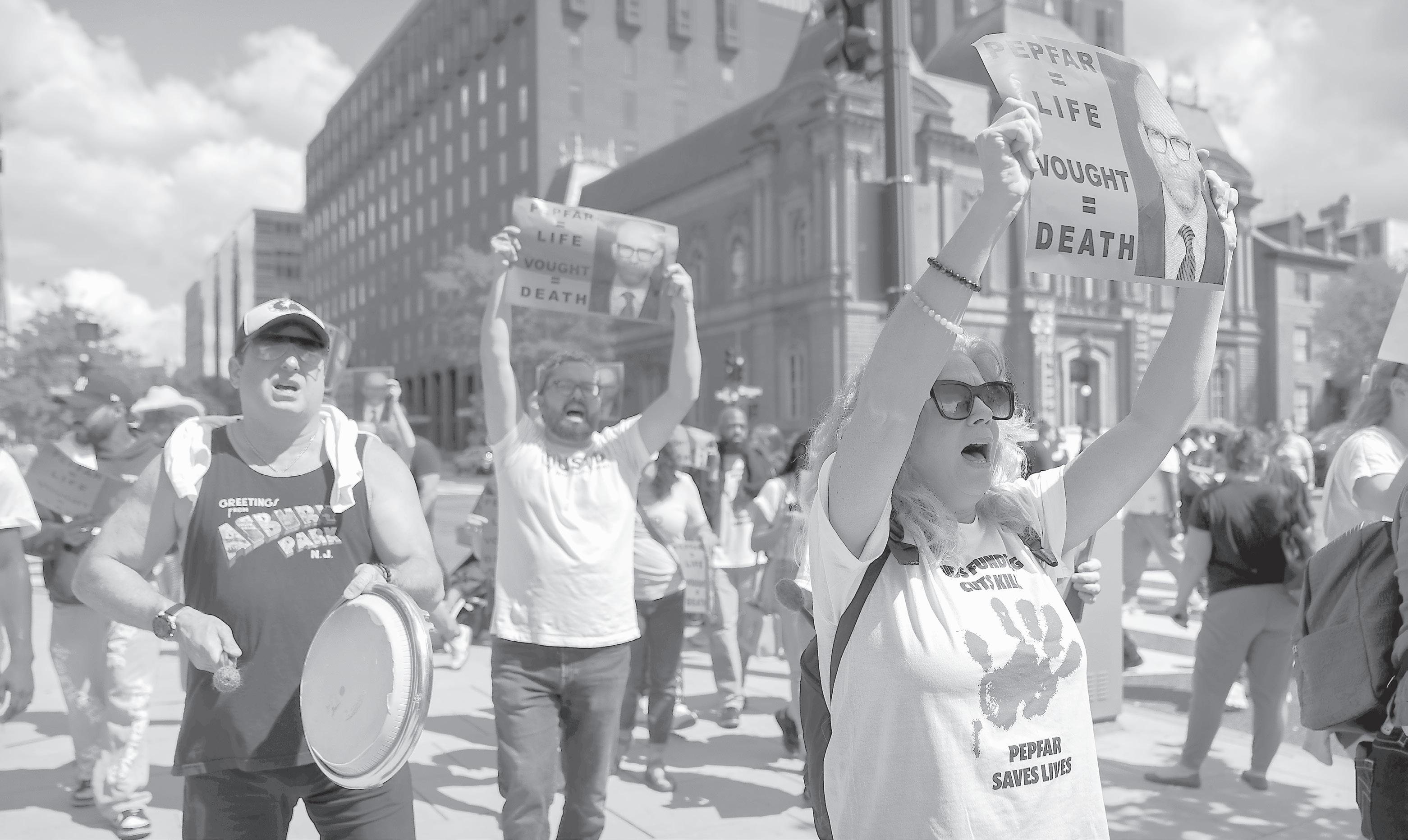
By LAURAN NEERGAARD
AP Medical Writer
THE US is purchasing enough doses of a new twice-a-year H IV prevention shot to share with up to 2 million people in poor countries by 2028, the State Department announced Thursday.
Gilead Sciences had already announced it would sell that supply of the protective drug lenacapavir at no profit for use in low- and
middle-income countries that are hard-hit by H IV. The question was who would buy and distribute them after the Trump administration slashed foreign aid earlier this year – forcing closures of health clinics and disrupting H IV testing and care in many countries. Under Thursday’s move, the US will purchase the doses under the P E PFAR program and work with governments in hard-hit countries on how to distribute them.
The priority will be to protect pregnant or breastfeeding women, said Jeremy Lewin, a State department senior official.
Lewin said the program will be a collaboration with the Global Fund, another international program that funds H IV treatment and prevention efforts but wouldn’t disclose how much the US was investing.
“We’re hoping, with the Global Fund, to help 2 million people get on
the medication over the next three years but could potentially see more,” he said.
There are more than 30,000 new H IV infections in the US every year and 1.2 million people are living with the virus. Worldwide there are 1.3 million new infections annually and nearly 40 million people living with the virus.
Many experts say lenacapavir is the most powerful option yet for what’s called Pr E P
– using preventive medicines to guard against sexually transmitted H IV. Unlike daily pills that people may forget, each lenacapavir shot offers protection for six months. In two groundbreaking studies with people at high risk, it nearly eliminated new infections.
The drug already has been approved for use in the US and E urope.
In March, the head of the UN AIDS agency urged the Trump
administration and Gilead to make the preventive shots available worldwide for millions.
Gilead has signed agreements with generic drug makers to produce low-cost versions of the shot for poor countries, mostly in Africa, Southeast Asia and the Caribbean. The doses provided at-cost for up to 2 million people in those countries was intended to be a stopgap until the generics are available.

By NATALIE MELZER Associated Press
ISRAEL’S Supreme Court on Sunday ruled that the government has failed to provide Palestinian security prisoners with adequate food for basic subsistence and ordered authorities to improve their nutrition.
The decision was a rare case in which the country’s highest court ruled against the government’s conduct during the nearly two-year war.
Since the war began, Israel has seized thousands of people in Gaza that it suspects of links to Hamas.
Thousands have also been released without charge, often after months of detention.
Rights groups have documented widespread abuse in prisons and detention facilities, including insufficient food and health care, as well as poor sanitary conditions and beatings. In March, a 17-year-old Palestinian boy died at an Israeli prison and doctors said starvation was likely the main cause of death.
Sunday’s ruling came in response to a petition brought last year by the Association for Civil Rights in Israel and the Israeli rights group Gisha. The groups alleged that a change in the food policy enacted after the war in Gaza began has caused prisoners to suffer malnutrition and starvation.
Last year, National Security Minister Itamar Ben-Gvir, who oversees the
prison system, boasted that he had reduced the conditions of security prisoners to what he described as the bare minimum required by Israeli law.
In Sunday’s ruling, the panel of three justices ruled unanimously that the state is legally obligated to provide prisoners with enough food to ensure “a basic level of existence.”
In the 2-1 ruling, the justices said they found “indications that the current food supply to prisoners does not sufficiently guarantee compliance with the legal standard.” They said they had found “real doubts” that prisoners were eating properly, and ordered the prison service to “take steps to ensure the supply of food that allows for basic subsistence conditions in accordance with the law.” Ben-Gvir, who leads a small far-right ultranationalist party, lashed out at the ruling, saying that while Israeli hostages in Gaza have no one to help them, Israel’s Supreme Court “to our disgrace” is defending Hamas militants. He said the policy of providing prisoners with “the most minimal conditions stipulated by the law” would continue unchanged.
ACRI called for the verdict to be implemented immediately. In a post on X, it said the prison service has “turned Israeli prisons into torture camps.” “A state does not starve people,” it said. “People do not starve people — no matter what they have done.”

JUNKANOO from page one
The Tribune yesterday that practices had already resumed to allow groups to prepare for the upcoming parades. He said other parading activities would remain on hold pending discussions on the government’s proposed Junkanoo Authority Bill.
Hours later, a notice posted on the JCNP’s social media pages
announced that all parading activities will resume on September 8.
The JCNP, which has managed New Providence’s major Junkanoo parades since 2004, in July suspended all Junkanoorelated activities, including Emancipation Day events, practices, rush-outs, and side parades in protest of the new Junkanoo bill.
The JCNP views the proposed authority as an attempt to centralise control and roll
back the organisation’s self-governance.
However, government officials have pushed back against this narrative, maintaining that the bill aims to formalise Junkanoo as a national institution capable of generating economic benefits, with an independent authority taking over the government’s role in managing the parades.
The parties are scheduled to meet this week to discuss the JCNP’s
recommendations, following a postponement of the meeting last week.
Yesterday, Mr Taylor declined to reveal details of those recommendations.
However, the standoff comes as Junkanoo groups prepare for the Boxing Day and New Year’s Day parades.
In a statement over the weekend, the Ministry of Youth, Sports and Culture advised groups to complete registration for seed funding by Friday, September
12.
Seed funding distribution is set to begin on September 19 in New Providence, with disbursements to follow in the Family Islands on staggered dates through October.
Yesterday, Mr Taylor confirmed that the JCNP’s suspension does not extend to seed funding. He added: “That is the government’s money. We ain’t getting into that. That is between the groups and
the government.” He also revealed that both factions of the Valley Boys have registered with the JCNP and will compete in the upcoming parades.
Last year, The Way Forward Valley Boys, led by Trevor Davis, was relegated to the noncompetitive “fun group” category — allowed to perform but ineligible for prizes — after failing to properly register with the JCNP.

of
and Grand Market in Bridgetown, Barbados. Junkanoo was the grand finale for The Bahamas’ performance that night, that included singers, dancers, the spoken word, the award-winning band Shaad Collie and the VIPs, the cast of “First Comes Mourning”, and a live painting by Abby Smith.



By KEILE CAMPBELL
Staff Reporter

FLAMINGO from page one
Baha Mar and in dealing with the director of their art programme, John Cox, who is also the chairman of the National Art Gallery of the Bahamas, he should know better.”
“The only one who knows the mysteries and secrets of Ringo in its entirety is me.
But for instance, Ringo has a heart that we crafted, and within the heart, it has a note. And on that note are words like love and compassion, and even Baha Mar. And it totally goes against the good vibes I was putting into sculpting Ringo that Baha Mar has now bastardised.”
Mr Smith said he was inspired by the late Steve Burrows, the Bahamian artist behind iconic roundabout sculptures such as the rooster on Independence Drive and the conch shell on JFK Drive. He noted that he had previously assisted with restoring Mr Burrows’ work, always in consultation with the original artist, and said he was pleased with the recent repainting of the rooster statue.
In a YouTube video, Mr Smith lamented what he called the undermining of his work, adding that erasing his signature was deeply hurtful.
“I think it’s a slap in the face to creative artists to
sand off their work, including their signature,” he said.
“It’s not only a slap in the face to me, but it’s a slap in the face to those who are trying to make improvements in the country and being told by non-Bahamian ownership what is right for Bahamians and our visitors.”
Mr Smith said he intends to raise his concerns with the Bahamas Art and Musicians Union. John Cox, executive director of arts and culture at Baha Mar, declined to comment when contacted.
Despite his criticism, Mr Smith said he remains willing to restore the statue himself at no cost if Baha Mar were to approach him.
